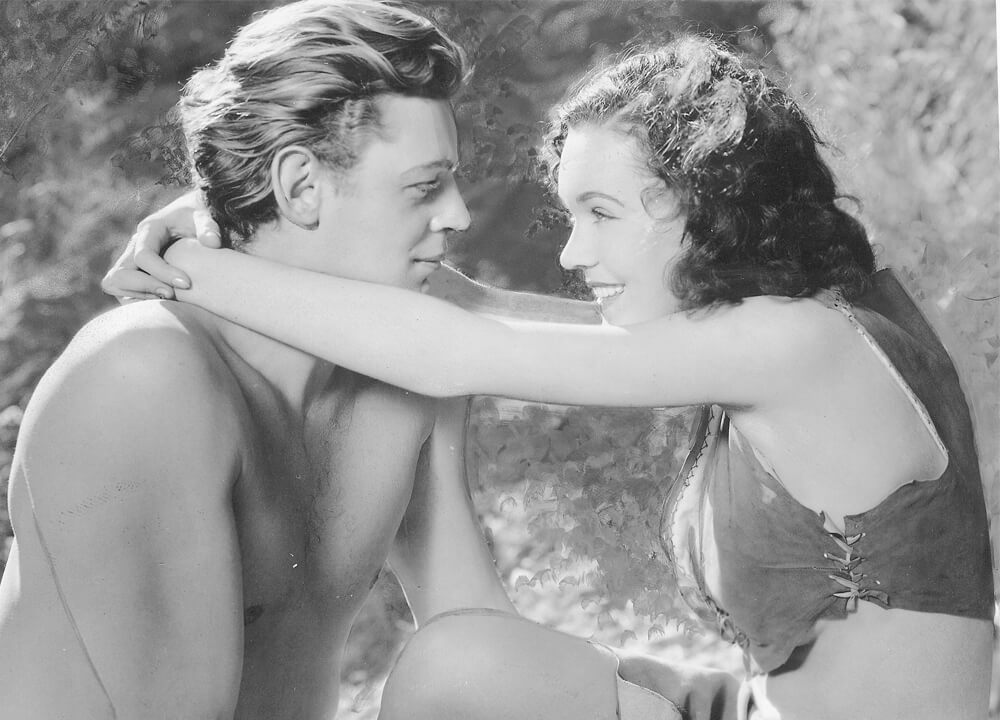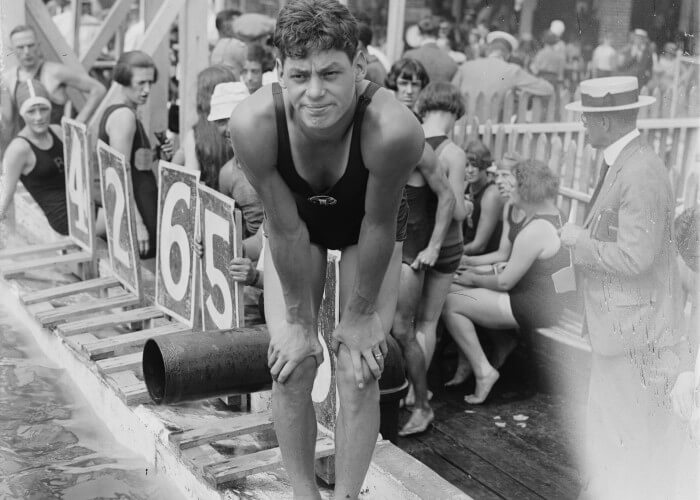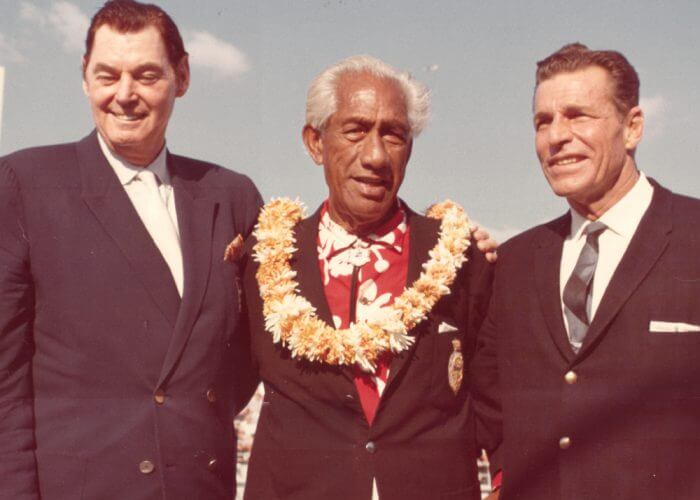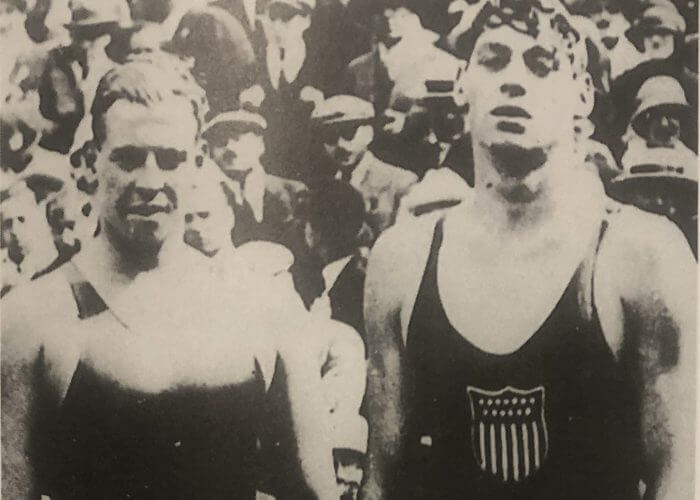A Century Later, Johnny Weissmuller – Champion Ape Man – Remains An Iconic Figure

A Century Later, Johnny Weissmuller – Champion Ape Man – Remains An Iconic Figure
It’s been a century since Johnny Weissmuller won the first national title of his illustrious career, and nearly 100 years since his first world record. The legacy of the man who would become Tarzan endures.
The way he is remembered varies from person to person. For as many people who know him as one of the greatest swimmers in history, an equal number remember him for playing the prominent Hollywood role of Tarzan. Either way, Johnny Weissmuller – granted a star on the Hollywood Walk of Fame and inducted into the International Swimming Hall of Fame – was revered as one of the 20th century’s most iconic figures.
Many recollections of Weissmuller paint a man running around bare-chested and wearing nothing more than a loin cloth. A cinematic star during the first half of the 20th century, Weissmuller was the human King of the Jungle, perfecting the Tarzan scream while becoming the most-famed actor to handle the role on the big screen.
Yet, before he went to Tinsel Town, Weissmuller etched his name in the annals of swimming, becoming the biggest star of his time and an Olympic champion. Even today, nearly a century after Weissmuller rode his freestyle stroke to multiple Olympic gold medals and numerous world-record performances, he is an easy choice as one of the top-10 swimmers of all-time.
Ask anyone with a vast knowledge of swimming about the greatest American men to ever hit the pool and chances are, you will get a six-name list which spans 100 years. The list will include Duke Kahanamoku and Weissmuller as stars of the early years, setting the table for Don Schollander and Mark Spitz and, eventually, Matt Biondi and Michael Phelps.
How Weissmuller came to stardom is a unique story. Like most swimmers, he was in the water at a young age, instructed by a doctor to start building muscle after dealing with a bout of polio. While Weissmuller was a member of a YMCA team in Chicago, the extent of his talent was not immediately realized.
Coached by William Bachrach, Weissmuller was kept out of the public eye by his mentor until the finer details of the sport were enhanced. It wasn’t until Bachrach was satisfied with Weissmuller’s skill and all-around ability that he allowed him to reveal his talent to a wider audience.
“Bachrach kept young Weissmuller under wraps for a year, refining his start and stroke,” a Chicago Tribune article once stated. “In August 1921, he turned his protege loose to win national championships in the 50-yard and 220-yard distances. He never lost a swimming competition after that.”
The unchaining of Weissmuller set in motion what proved to be the most-illustrious career of any swimmer at the time, as Weissmuller went on to set more than 50 world records and win more than 50 national championships. More impressive, his excellence spanned several distances and was not confined to just the freestyle stroke.
Rather than focus on the shortest distances contested at the time, Weissmuller set world records – at one point or another – in the 100, 200, 400 and 800 distances. For good measure, he was also a stellar backstroker, even setting a world record in that stroke. Further setting Weissmuller apart was the fact that he was far ahead of his time.
The future film star didn’t just establish world records. His global standards endured for years, most notably his marks in the 100 freestyle and 200 freestyle. In the 100 free, Weissmuller was the first man to break the one-minute barrier and held the world record from 1922-1934. In the 200 free, he stood as the world-record holder from 1922-1935, shaving 11 seconds off the global standard between the first and last time he set the record.
It was in Olympic competition, however, where Weissmuller excelled greatest and forever made himself a household name. In order to attain that Olympic glory, Weissmuller first had to pull off one of the greatest bits of deception in sports history.

Johnny Weissmuller – Photo Courtesy: Wikipedia Commons
As the 1924 Olympic Games in Paris neared, questions surrounding Weissmuller’s American citizenship began to surface, and with good reason. Weissmuller was actually born – according to official records – on June 2, 1904 in the small town of Friedorf, part of Romania. Although he moved to the United States with his parents seven months later, he was not an American citizen.
This fact became an issue leading up to the Paris Games because Weissmuller needed official documentation of his citizenship in order to secure an American passport which would enable his travel to the Olympics. For this reason, Weissmuller put into motion a major ruse, one which proved to be successful.
While his father once insisted Weissmuller was born in Chicago, it was later changed to state Weissmuller was born in Windber, a small town in Southwestern Pennsylvania. Indeed, a Weissmuller was born in this town, but it was Johnny’s younger brother, Peter. Using this familial connection to his advantage, Weissmuller got hold of baptismal records from St. John Cantius Catholic Church for his brother, Petrus Weismuller. Inserted between the first and last name, and in different ink and penmanship, was “John.” Weissmuller asserted that this official record was his and it met the needs to allow Weissmuller participation in the 1924 Olympics.
“After satisfying Olympic and government officials of his American citizenship, Weissmuller joined the U.S. team and swam in Paris,” stated a 1984 Sports Illustrated article on the doubts concerning Weissmuller’s citizenship. “He became an instant national hero. It seemed nobody now wanted to raise questions about his citizenship. Claiming Windber as his birthplace not only gave Weissmuller the opportunity to produce ‘proof’ of his American birth but also provided him with a new hometown, which in later years would welcome him back as its most famous native son.”
Weissmuller ran with the deceit for years, even celebrating a day in his honor in Windber in 1950, years after his Olympic exploits. On that day, Weissmuller went as far as to say, “I have always wanted a hometown, and now I have one. This is the biggest thrill I ever had in my life and this includes the events when I won the Olympic titles in 1924 and 1928 and was presented medals by the queen of the Netherlands.”
Throughout his life, Weissmuller assured his secret was well-protected. He never told his family of his true birthplace, including his five wives and only son, Johnny Jr., and he told his biographer that he was born in Windber, Pennsylvania. According to the Sports Illustrated article, those in Romania who knew the true story of his birth in their homeland, did not want to ruin his success, for they were proud of what he achieved.
After Weissmuller died in 1984, his son learned the truth when interviewed about the topic. After the initial shock, he toasted his father to Arlene Mueller of Sports Illustrated, “To the old man. He sure could keep a secret.”
If there were ever concerns about Weissmuller’s accomplishments being stricken due to his trickery, it seems those days have passed. Instead, Weissmuller is revered for his excellence in the pool. With his citizenship issues resolved, Weissmuller went to the 1924 Olympics and won three gold medals. He won individual titles in the 100 freestyle and 400 freestyle and helped the 800 freestyle relay to victory. For good measure, he added a bronze medal as a member of the American water polo team.
 By setting world records in the 100 freestyle, 200 freestyle and 400 freestyle in 1922, Weissmuller set himself up for Olympic success and headed to Paris with high expectations. His triumph in the 100 freestyle was the marquee win, as Weissmuller prevailed by more than two seconds over Kahanamoku, the Olympic champion in the event in 1912 and 1920, and had it not been for the cancellation of the 1916 Games due to World War I, a likely three-time Olympic champion. Although Weissmuller (pictured left with Kahanamoku, centre, and Buster Crabbe, right) had already set world records, his win over Kahanamoku marked the official changing of the guard.
By setting world records in the 100 freestyle, 200 freestyle and 400 freestyle in 1922, Weissmuller set himself up for Olympic success and headed to Paris with high expectations. His triumph in the 100 freestyle was the marquee win, as Weissmuller prevailed by more than two seconds over Kahanamoku, the Olympic champion in the event in 1912 and 1920, and had it not been for the cancellation of the 1916 Games due to World War I, a likely three-time Olympic champion. Although Weissmuller (pictured left with Kahanamoku, centre, and Buster Crabbe, right) had already set world records, his win over Kahanamoku marked the official changing of the guard.
Despite having to unseat the legendary Kahanamoku, who went on to become the “Father of Surfing” by spreading the popularity of that sport, Weissmuller’s win in the 100 freestyle proved to be his easiest individual event. In the 400 freestyle, which didn’t suit Weissmuller as well as the shorter events, the American engaged in a tight duel with Sweden’s Arne Borg and Australia’s Andrew “Boy” Charlton, considered two of the finest distance swimmers in history.
Weissmuller and Borg battled for the lead throughout the race, the Swede in front with 50 meters remaining. Over the last lap, Weissmuller summoned every ounce of his energy to regain the lead from Borg, and to fend off Charlton, who was surging at the finish.
“Much was expected of the meeting of three great champions in this Olympic competition: Johnny Weissmuller, Australia’s Boy Charlton and Sweden’s Arne Borg,” wrote Emile-Georges Drigny, who was responsible for the swimming reports at the 1924 Games. “And indeed, from start to finish, the contest between these true mermen produced an aquatic battle the likes of which we have seldom seen and might never see again.”

Arne Borg, left, and Johnny Weismuller in 1924
The winning ways continued for Weissmuller through the 1928 Olympics in Amsterdam, where he repeated as champion of the 100 freestyle and again led the United States to gold in the 800 freestyle relay. When his amateur career came to a close, Weissmuller was known to have lost only two races, both to Olympic medalist Ludy Langer in the early 1920s.
The dominance exhibited by Weissmuller in Paris and Amsterdam was nothing short of phenomenal and placed him on a pedestal with other sports stars of his era, including Babe Ruth, Bobby Jones, Red Grange and Bill Tilden. He clearly showed himself to be in another realm than the competition, leaving his foes to compete for the minor medals. A vote of 250 sports journalists named Weissmuller the greatest swimmer of the first half of the 20th century. It was no surprise when he was inducted as a member of the inaugural class of the International Swimming Hall of Fame in 1965.
Still swimming and working for a bathing suit company two years after the Amsterdam Games, Weissmuller was approached about taking a screen test while in Los Angeles for the upcoming movie, “Tarzan The Ape Man.” He went to MGM Studios for the shoot, along with 150 other men, but never thought the test would work out.
“I had to climb a tree and then run past the camera carrying a girl,” he said. “There were 150 actors trying for the part, so after lunch, I took off for Oregon on my next stop for the swimsuit outfit. Somebody called me on the phone and said ‘Johnny, you got it.’ ‘Got what?’ ‘You’re Tarzan.’ ‘What happened to those other 150 guys?’ ‘They picked you.’
“So the producer asked me my name and he said it would never go. ‘We’ll have to shorten it,’ he said. ‘Weissmuller is too long. It will never go on a marquee.’ The director butted in. ‘Don’t you ever read the papers? This guy is the world’s greatest swimmer.’ The producer said he only read the trade papers, but okay, I could keep my name and he told the writers, ‘put a lot of swimming in the movie, because this guy can swim.’
“So you see why I owe everything to swimming,” Weissmuller said. “It not only made my name, it saved my name. Without swimming, I’d be a nobody. Who ever heard of Jon Weis, marquee or no marquee?”
Weissmuller starred in 12 Tarzan films and enjoyed other roles in movies and television. He was a high-paid star and affirmed himself as that unique person who could close one career and excel at an equally successful level in another.
Still, it was swimming – namely what he achieved in the Olympic Games – which made his vast success a possibility.
“Johnny Weissmuller was the first swimmer to bring the sport into the mainstream with his popularity, especially with his subsequent Tarzan roles,” said Bill Mallon, one of the world’s foremost Olympic experts. “He was not just a public persona, however, as he was perhaps the most dominant swimmer of all-time, shattering barriers in several events. The rumors that he was never defeated from the early 1920s onward are not quite true, but his losses to other swimmers were exceedingly rare. In today’s era, with many more events and professional swimming, he likely would have competed into the 1930s and maybe approached Michael Phelps’ later marks in terms of medals and gold medals won.”



